WOLE SOYINKA AWARD FOR INVESTIGATIVE REPORTING
Winning Works 2012
Share this
Winner
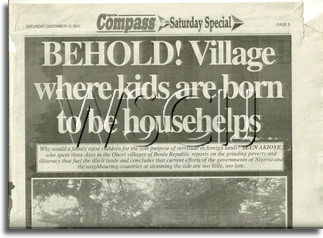 The work by Seun Akioye published December 10, 2011 in the Nigerian Compass Newspaper, under the title: Behold! Village where kids are born to be house helps, won the prize in the print category.
The work by Seun Akioye published December 10, 2011 in the Nigerian Compass Newspaper, under the title: Behold! Village where kids are born to be house helps, won the prize in the print category.
The report is a staggering revelation of how immense poverty in a West African community, Kpedekpo village in Benin Republic, became the fodder for child slavery and the complicity of regulatory agencies in the home country and receiving countries like Nigeria. The report also speaks to the moral failure of the Nigerian (and perhaps other countries’) middle class who encourage the trading of minors for housemaids.
In this masterly work, painstakingly reported and elegantly executed, Seun brings to the surface, with a brusque urgency, one of the most vicious human rights abuses of our time.
Readers will not miss the acute sense of history on display in the piece, and the challenge the writer poses to ending this most inhuman trade which, in 20 years of cross border human trade, confronts the governments of the two countries, and the regional/international mechanisms in place to stamp out this human right shame, with their ineptitude.
Runner up
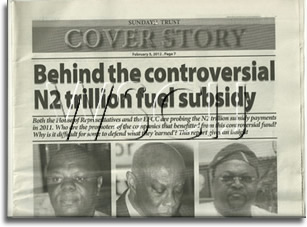 Through his February 5, 2012 report in Daily Trust, under the title Behind the controversial N2 trillion fuel subsidy, Theophilus Abbah brilliantly delves into the opaque terrain of oil sector corruption, shredding the crusty cones of official and mafia-type shells stealthily arranged to conceal a dizzying corruption in the subsidy programme through which the nation was fleeced N2 Trillion.
Through his February 5, 2012 report in Daily Trust, under the title Behind the controversial N2 trillion fuel subsidy, Theophilus Abbah brilliantly delves into the opaque terrain of oil sector corruption, shredding the crusty cones of official and mafia-type shells stealthily arranged to conceal a dizzying corruption in the subsidy programme through which the nation was fleeced N2 Trillion.
The report departs from the mere superficial reporting so characteristic of our press today by offering depth through the naming of directors, proxy personalities and the oil companies involved in this racket, and by so doing, paving way for the investigations currently apace with the law enforcement communities.
By his excellent report and his professional tenacity to see it to life, Mr. Abbah has shown that good journalism matters; and it can change a diseased world.
Winner
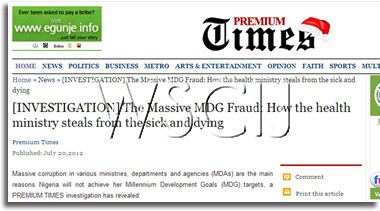 In his Premium Times serial report titled The Massive MDG Fraud, Idris Akinbajo asks himself if the country will ever fulfill the terms of the Millennium Development Goals (MDGs).
In his Premium Times serial report titled The Massive MDG Fraud, Idris Akinbajo asks himself if the country will ever fulfill the terms of the Millennium Development Goals (MDGs).
The series shows widespread fraud in the Nigerian federal government program intended to fight poverty by meeting the Millennium Development Goals (MDGs). This three-part series shows that toilets built for school children were “actually pit latrines with no water. They were so poorly constructed that they were damaged by the first rain that fell in 2009. They have since become homes for rodents, as students cannot use them, for safety reasons.” As for school buildings built with MDG funds: “The ceiling of the classrooms simply collapsed following the first rainfall after construction.” Parents pulled their children out of school, fearing for their safety. Thus far Akinbajo reports, the government has taken no action. “The Minister of State for education says his ministry cannot punish offenders based on newspaper expose and audit reports.” Among other findings: most projects intended to provide clean drinking water were phantom projects. The desperate situation of the rural areas is best captured in the outcry of one Mrs. Oladimeji who says: ‘We don’t even want to know how much they have collected or spent. Let them just help us and give us the water,’ Mrs. Oladimeji said.”
Runner up
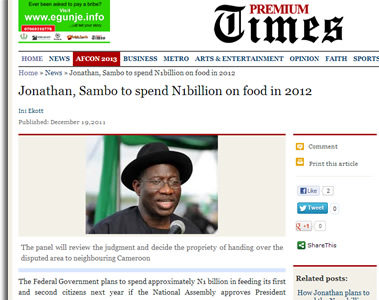 In his piece titled How officials squander public funds on lavish lifestyles, published in the online media – Premium Times, Ini Ekott brilliantly sneaks behind the lines and, through a rigorous forensic analysis of budget process, exfoliates the underbelly of the moral composition of Nigerian political officials.
In his piece titled How officials squander public funds on lavish lifestyles, published in the online media – Premium Times, Ini Ekott brilliantly sneaks behind the lines and, through a rigorous forensic analysis of budget process, exfoliates the underbelly of the moral composition of Nigerian political officials.
What he unearths is a golden nugget of scandalous proportions. In all these six part serial of great significance, the reporter brings the shameless corruption and abuse of power that characterizes the federal budget process. With mouth agape, we are dragged through a tunnel of zero accountability at the leadership level, a brazenness that is unimaginable in the administration of public funds.
We hear not only of the Vice President’s waste of N323 million on exotic cars in 2011 but by the exercise of grand impunity how he follows up with marginal spending of about N200 million in 2012.
What is significant is that the reporter also helps us understand that public action can cure impunity. Through public outcry orchestrated by the press both the presidency and the parliament reverses their run on public treasury.
Winner
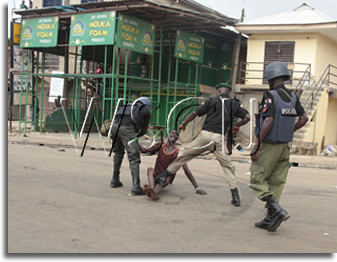 Police’ brutality, a photo entry by two-time runner-up of WSAIR, and best in photojournalism by the performing musician association of Nigeria award, Olatunji Obasa, is an attestation to the power of the lens to record state brutality and the challenge of human rights abuse in Nigeria.
Police’ brutality, a photo entry by two-time runner-up of WSAIR, and best in photojournalism by the performing musician association of Nigeria award, Olatunji Obasa, is an attestation to the power of the lens to record state brutality and the challenge of human rights abuse in Nigeria.
Olatunji Obasa’s winning work is an image of the recurrent case of police brutality in the country published in Punch Newspaper. This work earned him the winning prize in the category of photojournalism for the 2012 WSAIR.
Runner up
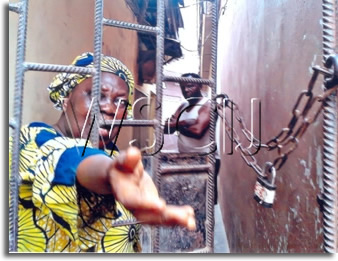 The photo-journalism category brings in vivid relief the challenges of everyday living under the pressures of human rights abuses in Nigeria. In his runner up photo titled Ojora House arrest, Adeparusi of National Mirror, brings the pain of age and the absence of a social net so striking and so piercing through the imprisonment of a widow who could not pay her rent.
The photo-journalism category brings in vivid relief the challenges of everyday living under the pressures of human rights abuses in Nigeria. In his runner up photo titled Ojora House arrest, Adeparusi of National Mirror, brings the pain of age and the absence of a social net so striking and so piercing through the imprisonment of a widow who could not pay her rent.
The judges commended Adeparusi for using the power of the lens to call for a more justice-based community. For this great work of journalism and art, he is awarded the runner up prize in photo journalism for the year 2012
Winner
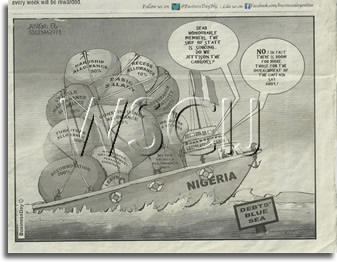 One work that best incarnates the spirit of the times and the governance quality in the country today is Bassey Asukwo’s Debts’ Blue Sea.
One work that best incarnates the spirit of the times and the governance quality in the country today is Bassey Asukwo’s Debts’ Blue Sea.
The judges’ board, in praising the work, spoke to its power and biting satire which drew sharp focus on how the nation sinks even as the politicians are smiling in luxury.
Asuquo, a former Art Teacher at the Grays International School, Doka, Kaduna – 1994 and Creative Director at Reni Folawiyo is currently cartoon editor at Business Day.
Through this work, we are introduced to his artistic talents, his gift to render a broad social narrative in austere artistic details.
Runner up
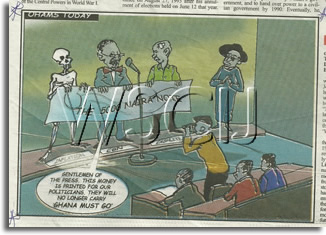 In his cartoon entry of Monday 27 August, 2012 in The Sun, Albert Ohams, bring sense and concern to the N5000 currency introduction debate. A Fine Art graduate of Yaba College of Technology Lagos. He has started his editorial career with Vanguard Media in 1984 and is currently Cartoon editor of the Sun newspapers. He is also recipient of the 2000 Nigerian media merit award and the 2007 DAME award. Ohams also launched a book on cartoon humour earlier this year. For this work, the judges board awards him the runner up prize for the 2012 WSAIR award.
In his cartoon entry of Monday 27 August, 2012 in The Sun, Albert Ohams, bring sense and concern to the N5000 currency introduction debate. A Fine Art graduate of Yaba College of Technology Lagos. He has started his editorial career with Vanguard Media in 1984 and is currently Cartoon editor of the Sun newspapers. He is also recipient of the 2000 Nigerian media merit award and the 2007 DAME award. Ohams also launched a book on cartoon humour earlier this year. For this work, the judges board awards him the runner up prize for the 2012 WSAIR award.
Winner
 In Travellers shun vaccination as touts take over, Ms. Tobore Ovuore of the National Mirror, brings a deft and fascinating talent to explore the irony of when official failure spurs a thriving industry of touts and quacks. Her chosen subject is how international travellers have shunned the demands for vaccination, an industry that is now exclusively the preserve of touts.
In Travellers shun vaccination as touts take over, Ms. Tobore Ovuore of the National Mirror, brings a deft and fascinating talent to explore the irony of when official failure spurs a thriving industry of touts and quacks. Her chosen subject is how international travellers have shunned the demands for vaccination, an industry that is now exclusively the preserve of touts.
In the course of doing the story which came about through a planned trip of management staff of National Mirror where staff only needed to pay to get their vaccination cards, Tobore’s life was endangered when she was given the vaccine despite her ill health. She was also threatened by some officials for taking the vaccination without an intention to travel.
Runner up
 OOUTH: An old, teething hospital by Eunice Adesola Ayo-Aderele, an assistant editor at Punch newspaper chronicles the need for urgent attention to the state of the Olabisi Onabanjo University Teaching Hospital (OOUTH) – the only tertiary hospital under the care of the Ogun state government, which once ranked as one of the best teaching hospitals in Nigeria.
OOUTH: An old, teething hospital by Eunice Adesola Ayo-Aderele, an assistant editor at Punch newspaper chronicles the need for urgent attention to the state of the Olabisi Onabanjo University Teaching Hospital (OOUTH) – the only tertiary hospital under the care of the Ogun state government, which once ranked as one of the best teaching hospitals in Nigeria.
According to Eunice, the hospitals ‘radiology department has been under lock and key for 2 years hence patients have to go outside the hospital for X-rays. There is no neurosurgeon in the hospital’s employ.’ She also narrated that ‘as at the time of the story the doctors complained of absence of a psychiatrist, pathologists, cardiothoracic, neurosurgeons, and dermatologists amongst others. The presence of such specialists makes the difference between a teaching hospital and other hospitals. The doctors fear that the hospital’s accreditation might be withdrawn if things persist.’
The Judges commended Ms. Ayo-Aderele’s painstaking concern for details and her robust effort to bring reform to the health sector through a cogent and attentive x-ray that can help public officials come to terms with the need for change.
Winner
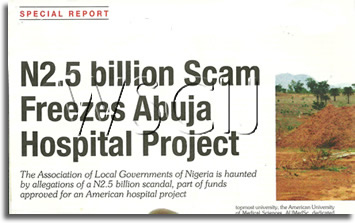 If there is one area that governance deficit has been most visible in the country, it is in the area of local government administration and no reporting brings this to immense relieve than Lucas Olumuyiwa Morenikeji of Tell Magazine, in his May 14, 2012 report: 2.5 Billion Scam Freezes Abuja Hospital Project.
If there is one area that governance deficit has been most visible in the country, it is in the area of local government administration and no reporting brings this to immense relieve than Lucas Olumuyiwa Morenikeji of Tell Magazine, in his May 14, 2012 report: 2.5 Billion Scam Freezes Abuja Hospital Project.
The story shows diligent reporting to expose the level of corruption that kills infrastructural development of and by so doing destroy the health development of the nation.
Runner up
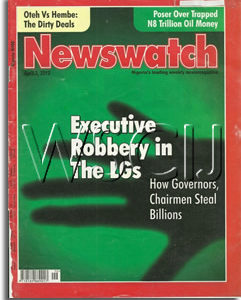 Through his report titled Executive Robbery in the LGs, Anthony Akaeze, Newswatch, explores an often discussed and troubling question of the pilferage that goes on in our local government levels. The judges’ board salutes the power of his writing, the strength of his perception, and the courage to tread where most reporting has hitherto ignored.
Through his report titled Executive Robbery in the LGs, Anthony Akaeze, Newswatch, explores an often discussed and troubling question of the pilferage that goes on in our local government levels. The judges’ board salutes the power of his writing, the strength of his perception, and the courage to tread where most reporting has hitherto ignored.
Anthony is also the author of Amuzia and other stories (a collection of short stories) and Just like a fairy Tale – a novel.

